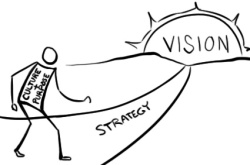Emotional Intelligence and Fakery
March 30, 2015 Leave a comment
 Emotional Intelligence (EI, or EQ – Emotional Quotient) was been a consistent topic in leadership circles for 30 years, and it has been written about from the 1930s.
Emotional Intelligence (EI, or EQ – Emotional Quotient) was been a consistent topic in leadership circles for 30 years, and it has been written about from the 1930s.
It is rare for a concept, theory or idea to remain at the forefront of organisational thinking for so long. One of the most well-known contributors to our understanding of EQ is Daniel Goleman, and his book Emotional Intelligence. Around the same time, Covey was publishing his book The 7 Habits of Highly Effective People and he went on to relate the habits to Emotional Intelligence.
The idea behind EQ is that our ability to relate meaningfully with other people matters more than our IQ. The concept goes deeper than the usual set of good communication skills, and includes the ability to empathise, and to manage your own and others’ emotions. Read more of this post
 Culture can be defined as the set of beliefs and behaviours of an organisation’s workforce. It is created from the messages that are received about how people are expected to behave. Cultures bind people together through shared goals, beliefs, approaches, routines, needs and values. Peer pressure helps behavioural norms develop over time, and these are influenced by the type of work performed, organisational history, successes and failures, physical conditions, the workplace environment and the demands of external entities such as customers, stakeholders, economic conditions etc. But the strongest influence on cultural norms are the senior leaders and managers within an organisation. It is the messages and the behaviours of this group that is most influential in shaping the culture of an organisation.
Culture can be defined as the set of beliefs and behaviours of an organisation’s workforce. It is created from the messages that are received about how people are expected to behave. Cultures bind people together through shared goals, beliefs, approaches, routines, needs and values. Peer pressure helps behavioural norms develop over time, and these are influenced by the type of work performed, organisational history, successes and failures, physical conditions, the workplace environment and the demands of external entities such as customers, stakeholders, economic conditions etc. But the strongest influence on cultural norms are the senior leaders and managers within an organisation. It is the messages and the behaviours of this group that is most influential in shaping the culture of an organisation. 










